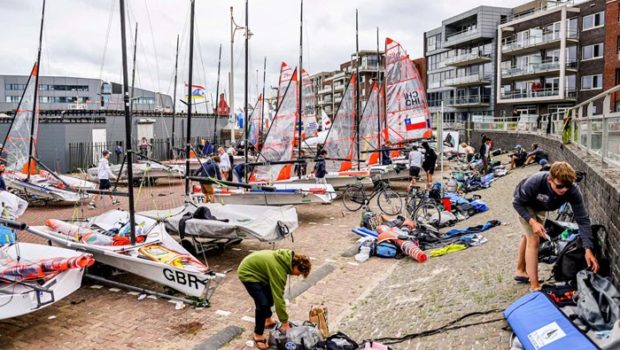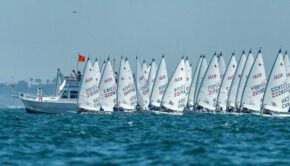Monitoring Olympic equipment quality
Published on January 20th, 2023
Sailing is an equipment sport, which by definition is a barrier for participation. But then not all equipment, even the same equipment, is not created equally. There is a long history of top competitors, regardless of class, investing time and money in a search for the best equipment, because when you are fast, everything else is easier.
With the heightened emphasis on Olympic competition, the search for perfect equipment is even costlier, which is partly a result of how World Sailing now selects the Olympic sailing program.
Events previously sailed boats which existed, so manufacturers had a broad range of customers, and that translates to heightened production and multiple suppliers. These elements keep quality high and prices low, but now the boats selected are, for the most part, designed and built specifically for the Olympics.
This shift has impacted cost and quality, and not in a good way, so after volumes of complaints, World Sailing is addressing this issue the organization made worse by launching a program to monitor the equipment across the Olympic Classes. Here’s an update from the international sailing federation:
Member National Authorities (MNAs), Committees, Race Officials, Classes, sailors, coaches, and the wider sailing community are invited to complete a survey. Answers will be anonymous and received in complete confidence.
“The perceptions around the quality of Olympic equipment drive the purchase behavior of athletes who not only seek to replace breakages but also strive to find the best performing equipment,” said Jaime Navarro, World Sailing’s Technical and Offshore Director.
“Better quality control can help reduce financial barriers. Reducing the need and use of equipment would also mean a more sustainable sport, and tighter controls on quality will help ensure fairness in the competition.”
With an increased focus on the quality assurance of sailing equipment, World Sailing aims to make the sport more accessible, more sustainable and maintain the integrity of competition at all levels.
The second element of the program sees the launch of an Equipment Manipulation Hotline which provides a reporting mechanism which is a fundamental provision of the Olympic Movement Code on the Prevention of the Manipulation of Competitions.
The World Anti-Doping Agency (WADA) considers prohibiting technologies if they are ‘performance-enhancing’ or ‘against the spirit of the sport.’ The Olympic Agenda 2020+5 encourages International Federations to have clear and transparent rules and regulations on technological manipulation and the consequences of their infringement.
Paris 2024 Olympic Sailing Program:
Men’s One Person Dinghy – ILCA 7
Women’s One Person Dinghy – ILCA 6
Mixed Two Person Dinghy – 470
Men’s Skiff – 49er
Women’s Skiff – 49erFx
Men’s Kiteboard – Formula Kite Class
Women’s Kiteboard – Formula Kite Class
Men’s Windsurfing – iQFoil
Women’s Windsurfing – iQFoil
Mixed Multihull – Nacra 17
Venue: Marseille, France
Dates: July 26-August 11
Details: https://www.paris2024.org/en/the-olympic-games-paris-2024/









 We’ll keep your information safe.
We’ll keep your information safe.